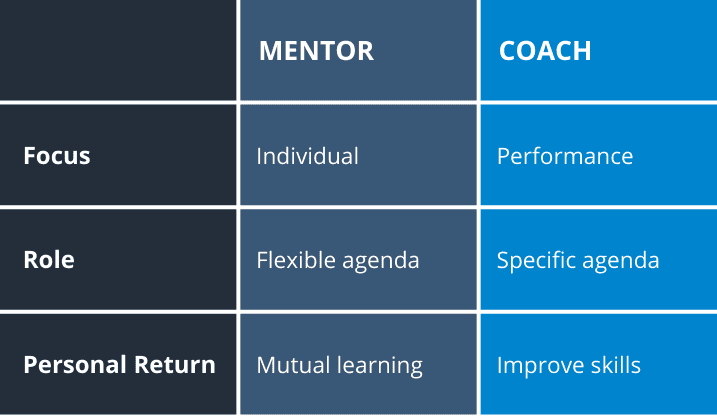Did you know it’s National Mentoring Month? Me either. I didn’t even know it was a thing. But it got me thinking about the new year and the dreaded “R” word… resolutions. A worthwhile goal for all leaders is to be better at coaching and mentoring. Why? Because one of the most complicated assets of any company is its employees. And sadly, they don’t come with step-by-step, easy-to-read instructions. Unless you count Omnia’s employee development assessment and reports!
As a manager, one of your many responsibilities might be to mentor and/or coach the members of your team, yet you may find yourself guessing at what will work. Or worse, you might standardize your approach to appeal to almost anyone. These methods might not yield great results and could even do more harm than good.
Tip #1: Listen Up
To be an effective mentor or coach, you need to listen carefully to your employees and deliberately look for clues about how each one is wired. Paying attention to what each member of your team talks about and looks to you for will help you tailor your time with them when it comes to coaching and mentoring.
Of course, having a behavioral assessment report at your fingertips is a great foundation and will help you navigate the motivations and drivers of each unique personality on your team. It’s also a great employee retention tool for building out development plans.
Tip #2: Know the Difference
While it may be debatable, most experts agree that mentoring and coaching are two distinct management tactics, each requiring a unique focus, role, and personal return.

The Coaching Relationship
While a mentor’s focus is on overall professional growth, a coach focuses on performance growth. There should be a specific agenda. Coaching requires critiques, evaluations, and an accurate understanding of an employee’s personal strengths and weaknesses.
The coaching relationship is more vulnerable than the mentoring relationship. It requires trust and mutual respect. Coaches need to know the personality of their employees, specifically their behavioral traits and typical work tendencies. Otherwise, inaccurate assumptions and inappropriate training techniques could be used.
For example, Mike is fairly new to sales. His performance is bumpy; some weeks are impressive, and other weeks are well below quota. After a few discussions with Rob, Mike’s manager, they both decide Rob will coach Mike on sales strategies.
Not knowing where Mike’s shortfall lies, Rob uses some broad coaching techniques. Regrettably, that time and effort are wasted when Mike still fails to consistently meet his quotas.
What happened?
Rob forgot that different people need different coaching strategies. If he had taken the time to assess Mike’s innate strengths and challenges, starting with an employee behavioral assessment, he could have based his strategies on concrete information.
Coaching cannot improve skills unless you have a handle on the reason(s) behind an employee’s performance issues. For example, a sales rep may resist making proactive calls in favor of performing pre-sales research. The sales rep could be:
Without some knowledge of that rep’s behavioral tendencies, it could take a lot of time to zero in on weaknesses.
The Mentoring Relationship
When assuming the role of mentor, your focus is on fostering the individual growth of your employee. Be prepared to take on a lot of personal involvement with your mentee, as you’ll be offering career guidance and giving advice in an informal, supportive, and encouraging manner. You aren’t looking to develop your mentee in a particular area of technical expertise but to help them focus on all areas of development in a personalized way. You should have a flexible agenda or no agenda. You want to listen, offer advice, and provide opportunities that support the growth your employee wants to achieve.
To establish a solid mentoring relationship, you need to find common ground in the area of communication. Have a clear understanding of how you typically convey your thoughts and make your style known. Be prepared to adjust your style — at least somewhat — to gain the interest and attention of the person you’re mentoring. Like the coaching relationship, there needs to be a high level of trust. The relationship you build should be supportive.
Are you a charismatic extrovert mentoring a shy introvert? If so, tone down your approach and force yourself to be succinct and focused as needed; otherwise, your words may miss their mark and result in mutual frustration. If you are the more reserved personality mentoring an outgoing, expressive people person, reverse the tactics and be more verbal and engaging. Those differences might seem problematic, but self-awareness can turn the problem into great synergistic energy.
If modifying your communication style makes you uncomfortable, fear not! Mentors don’t need to “outrank” the mentee; they simply need to be more experienced. In fact, it is more modern to provide a variety of mentoring relationships.
Consider assigning a peer mentor who is similar to your employee in personality so they can more easily trade thoughts, information, and ideas. A mentoring experience is two-sided: it promotes mutual learning that benefits both parties.
Look beyond traditional mentoring and consider things like reverse mentoring where a younger worker can offer technology guidance to older generations. There are also methods like speed mentoring, mentoring constellations, and group mentoring. The key is to be fresh, engaging, and appealing across generations.
Different Processes, Worthy Outcomes
Mentoring and coaching are different processes with worthy outcomes. If you choose to undertake one or both of them, make sure you start with a clear understanding of yourself and your employee. A personality assessment is a great place to start and can help you use your skills to accurately assess situations, find appropriate strategies, and implement winning plans.